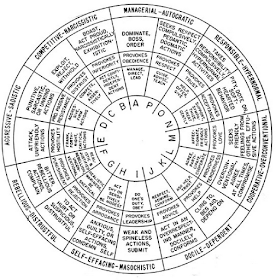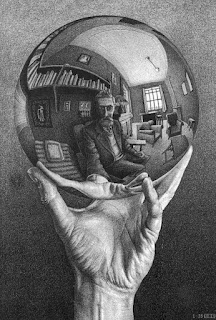Tim Leary invented a grid against which we can measure a range of human characteristics, back in the day before psychedelics and he still had a job as a Harvard Lecturer.
His PHD thesis explored his InterPersonal Grid as a tool for thinking about human typology. In spite of losing his reputation after some of his prankster days, elements of this work still appear to figure in quite a lot of modern psychological practice – quite apart from popularisations like Eric Berne’s “I’m OK, You’re OK”.
In later years, when Leary became an enthusiast for personal computers, he made a clunky, interactive game version - running on DOS, and pretty inaccessible once the 21st Century computers kicked in (you had to run it in odd retro modes) – available on a 51/4” floppy (remember those?).
Equal parts party game, roleplaying game and social simulation, Timothy Leary's Mind Mirror was released for Commodore 64, Apple II, and MS-DOS computers by Electronic Arts in 1985. The game was a digital reinterpreting of Leary's doctoral thesis.
He later stated that he had plans to release an updated version of the program with advanced graphics (including Apple Macintosh and Amiga versions), but that never occurred.
Text from back of original sleeve
Mind Mirror is an innovative, dynamic game bringing a whole new concept to "personality" software. Written by Dr. Timothy Leary, famous Harvard psychologist, author and lecturer, Mind Mirror combines the science of Leary's psychometric studies with his own inimitable wit and charm. Part tool, part game, and part philosopher on a disk, Mind Mirror is a provocative game perfect for parties or social gatherings like the popular board games Scruples or Trivial Pursuit.
The Rating Games.
Rate any person, place or concept with the
numeric rating scales. Mind Mirror evaluates your ratings, gives a brief text
analysis and plots your input on comparison charts called Mind Maps. You can
even use the rating scales to create your own characters and personalities.
Try comparing yourself to your ideal self,
yourself to a friend or loved one, even Reagan to Gorbachev. Be creative, have
a partner rate you while you rate yourself... you'll be surprised at the
differences.
Mind play and mind tools.
You can play the game using either Mind
Play or Mind Tools. In Mind Play, applications are light hearted, allowing you
explore topics and celebrities from areas like TV, films, athletics, and more.
In Mind Tools, applications are somewhat more serious, focusing on
Psychological Insight, Career Productivity, and Education.
Life Simulations.
Life Simulations gives you the opportunity
to take any of the subjects or personalities used in the rating games on
humorous, interactive text odysseys written by Dr. Leary.
You can play dozens of different life
simulations in any of four psychological realms. For example, enter the realm
of emotional insight and go back to kindergarten to face the class bully. Or
try the realm of social interaction and spend an evening in a punk rock bar or
a snooty bankers club.
Now Mind Mirror has finally been brought
up-to-date and appears as a Facebook App.
Eventually it may all appear on the MindMirror website. You can find a video ofTim explaining the possible uses - which lie far beyond a simple profiling
device. He suggested it could work as a
tool for changing oneself.
In one great story that goes around we hear that when sent to prison (for 10 years, as 'the most dangerous man on the planet') he found himself confronted with a test based on his own Interpersonal Grid.
In one great story that goes around we hear that when sent to prison (for 10 years, as 'the most dangerous man on the planet') he found himself confronted with a test based on his own Interpersonal Grid.
As a result, Leary was assigned to work as
a gardener in a lower security prison, which made escape possible. Leary
claimed his non-violent escape was a humorous prank and left a challenging note
for the authorities to find after he was gone. For a fee paid by The
Brotherhood of Eternal Love, the Weathermen smuggled Leary and his wife
Rosemary Woodruff Leary out of the United States and into Algeria. [Wikipedia accessed 02/06/2012] More on the prison escape in Confessions of a Hope Fiend.
Other Resources:
Other Resources:
Bruce Eisner "What is Futique?"
Original questionnaire format
Thought Processing Appliance
[I just downloaded the Manual for a small contribution, only to remember I already did that three or four years ago! The 18pp manual may or may not enhance your fun with the software]
You may also find some relevant material in Leary's "Changing My Mind, Among Others".
The Interpersonal Meaning of Music and Ethology by Ferdinand Knobloch
Thought Processing Appliance
If original versions of old games appeal to you, find it here on the old games site (with Manual)
[I just downloaded the Manual for a small contribution, only to remember I already did that three or four years ago! The 18pp manual may or may not enhance your fun with the software]
You may also find some relevant material in Leary's "Changing My Mind, Among Others".
The Interpersonal Meaning of Music and Ethology by Ferdinand Knobloch
Interview with Bob, from RAWilsonFans website
STARSHIP: Timothy Leary
has had a profound impact on you, both in terms of your life and work. How
would you assess his overall influence on modern society?
WILSON: Leary has made a
number of important contributions. In the first place, the Leary Interpersonal
Grid is one of the most widely used diagnostic tools in the nation. In fact, it
was used on Leary himself when he first arrived in the California prison
system. An understanding of the grid will give you a better appreciation of
yourself and other people. Leary's comprehension of LSD is, I think, superior
to any other scientist who has written about it; he understands it and knows
how to use it constructively. He recognizes, as few others do, that LSD
suspends the printed neurological programs of one's life, thereby creating
imprint vulnerability, in which a new imprint can be created. This means that
if one is working with someone who understands LSD, or the person himself
understands it, it is possible to create an entirely new ego for oneself. On
the other hand, if one is simply experimenting casually with it, one is likely
to imprint anything (including delusions).
Robert Anton Wilson wrote quite a lot of material based on the interpersonal grid in Prometheus Rising.







No comments:
Post a Comment